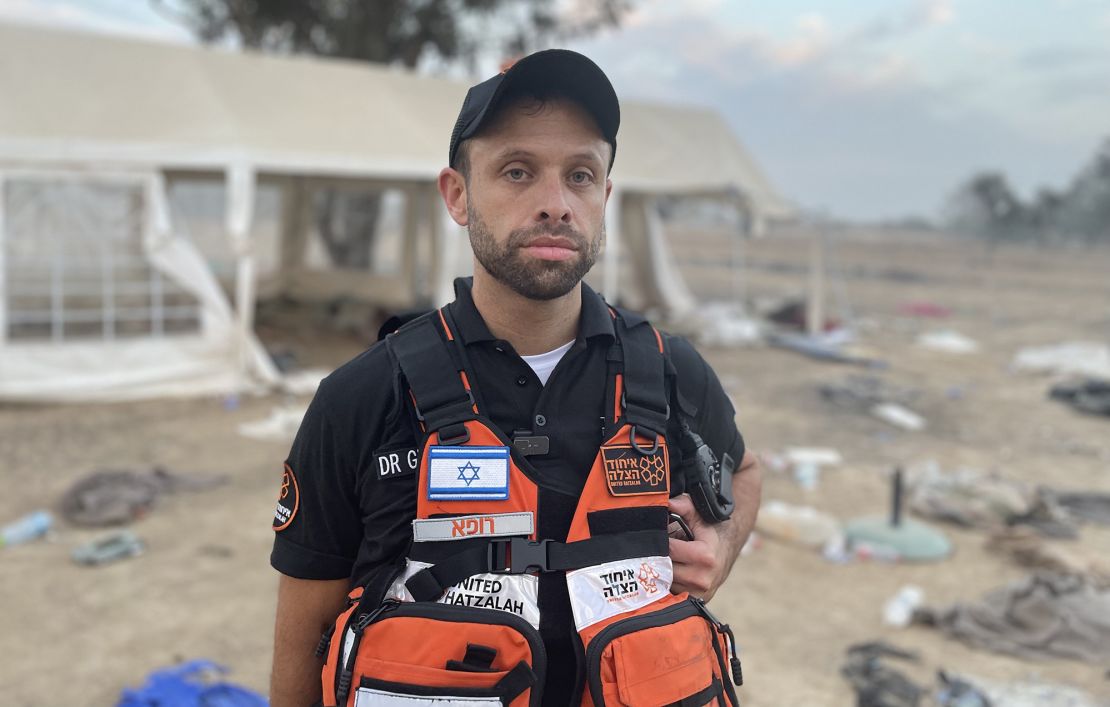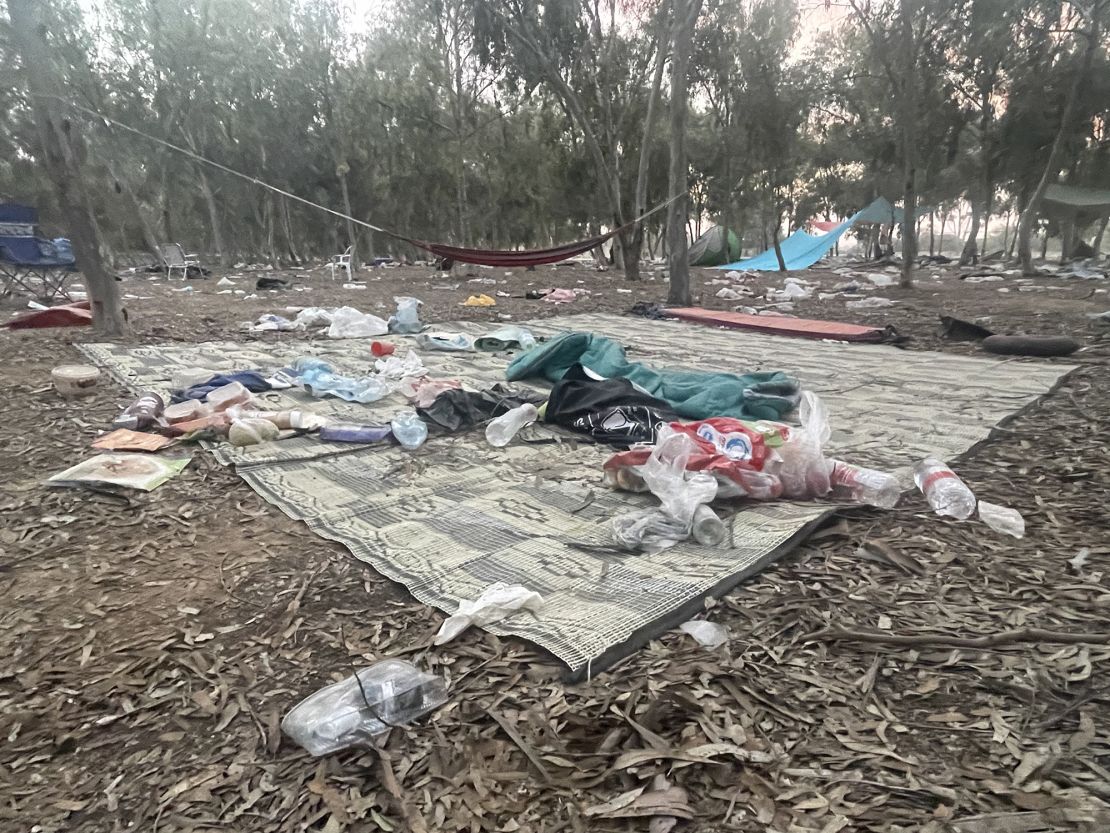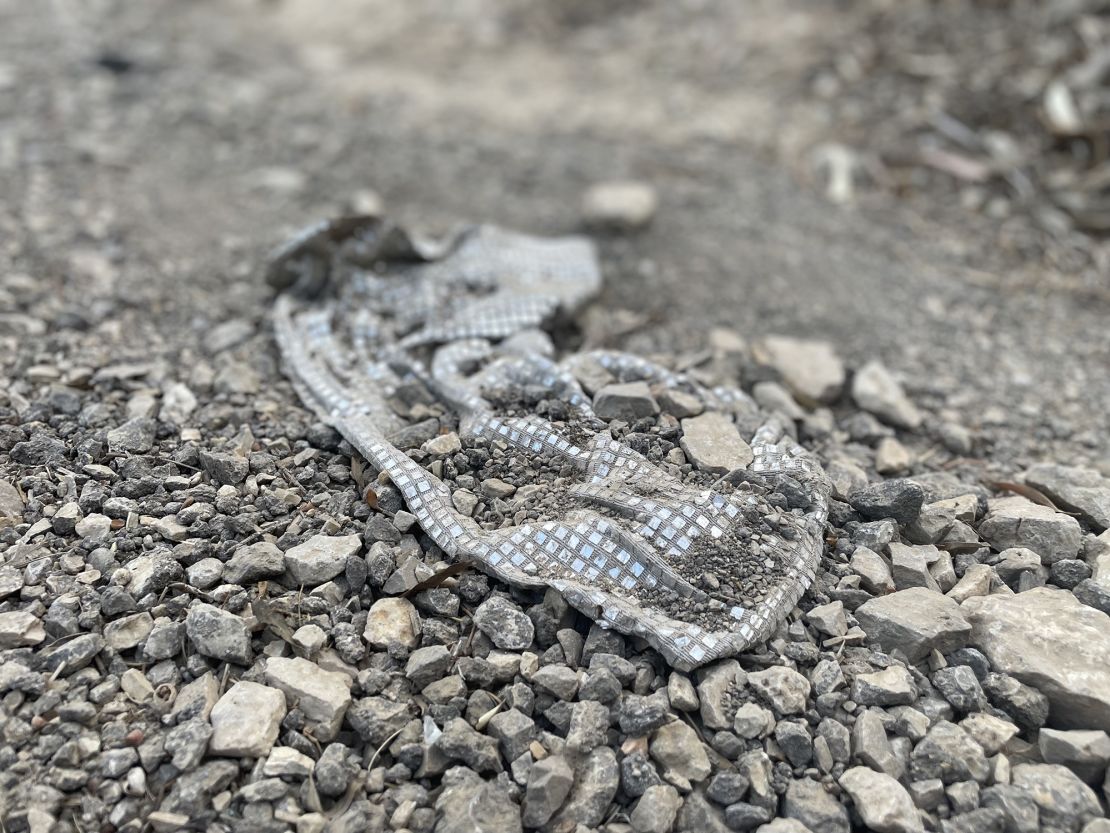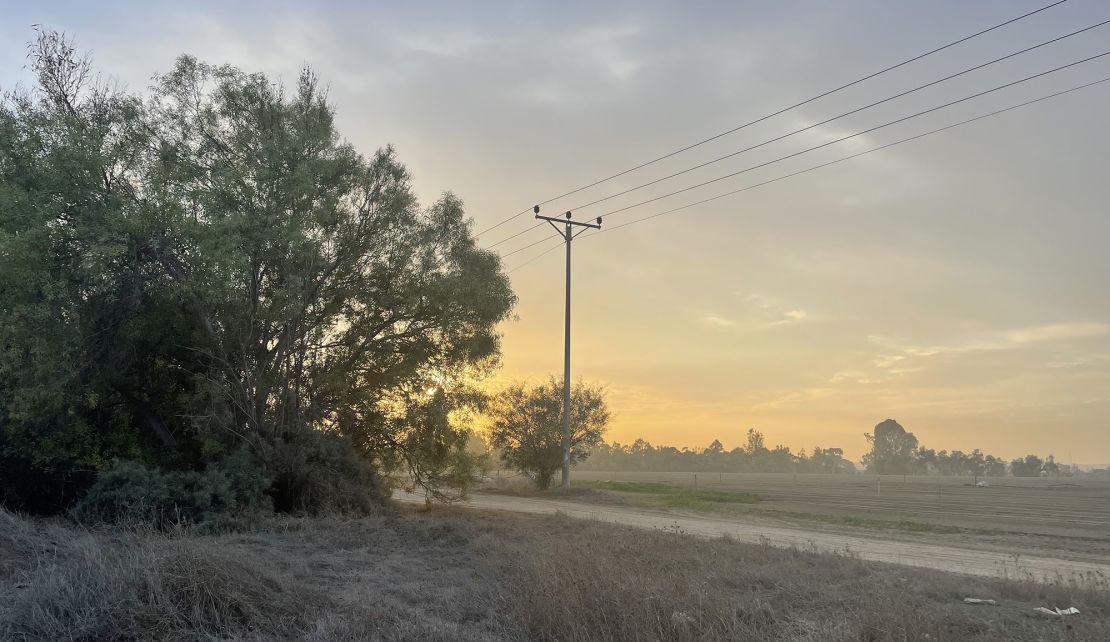Aliza Samuel walks carefully through debris left strewn across the ground, picking up a bracelet before coming across some small clay trinkets that had been handmade during the Nova Music Festival.
“People just dropped everything and left,” Samuel says. “(Hamas) just tore everything apart.”
Nearly one month on from the massacre of festival-goers in Re’im in southern Israel by Hamas militants, the 24-year-old has left her home for the first time since that day, to return with CNN to the place she witnessed the murders of four of her friends. More than 260 bodies were found at the site in the aftermath of the assault on October 7, one of the deadliest of the Hamas attacks, which killed at least 1,400 people in Israel.
“I think it’s important for me to come back,” she says. “No matter how painful it is…the world needs to know what happened here.”
But the terror of it all soon comes flooding back.
“I hear everything,” she says. “I hear the screaming, I hear the bikes, and I hear the gunshots.”

Traumatized but trying to process her experience, she recalls the moment that she has played over and over in her mind.
“I saw one of my friends, she was begging for her life,” she says. “She asked him to not kill her, to not kill her, to not kill her, and they didn’t care, they were laughing.”
She explains how, shortly after the break of dawn, her four friends were forced to line up and kneel down in the dust of an arid field.
From her hiding place behind the trees, she overheard the single final word her friends heard from their murderers.
“Enjoy,” the Hamas militants said in English, as they laughed, before shooting the three men and one woman at point-blank range, she said.
A few hours earlier, the friends had all been dancing and having fun together just a few hundred meters away at the festival, an event billed as a celebration of “unity and love” to mark the Jewish holiday Sukkot.
But the group of thousands of young partygoers proved to be an easy target for the Hamas attackers who broke through Israel’s defenses, descending on the festival via paragliders and motorbikes, massacring festivalgoers and taking others as hostages.
Israel subsequently announced a war against Hamas, the militant group that governs Gaza and launched the coordinated assault. The Israel Defense Forces (IDF) began a massive aerial bombardment of Gaza, pounding the tiny strip of land with air strikes, artillery fire and helicopter gunships, followed by a ground offensive.
The IDF says it is targeting the vast network of underground tunnels below Gaza that harbor the Hamas leadership along with their fighters and weaponry. But the onslaught has also led to an immense toll on Palestinian civilians, with more than 9,100 people killed in Gaza since October 7 - the majority of them women and children - according to the latest figures released by the Palestinian Ministry of Health in Ramallah, drawn from sources in the Hamas-controlled enclave.
People ‘had nowhere to run’
Walking back to her tent where she was sleeping when it all started, Samuel recalls the moment she was jolted awake soon after sunrise by the sound of Hamas rockets flying towards them from Gaza. She said she immediately woke her friend, and they fled their tent to try to find a concrete shelter.
Many of the other festival goers were asleep or still dancing, and either didn’t hear the alarm, or ignored it, placing their trust in Israel’s Iron Dome missile defense system to protect them.
But Samuel and her friend didn’t want to take any chances, so they started running. As they sought cover, they suddenly spotted Hamas fighters appearing in the skies above them on paragliders, shooting at people from the air as they came in to land.

Panicking, the pair sprinted across the open farmland surrounding the festival site and dived into a ditch behind a line of large trees. Samuel worked on trying to calm her friend down, clamping her hand over her mouth to stop her screaming, as they began to realize what was unfolding. Others were also hiding behind the trees, “trying not to breathe,” she added.
“(Hamas) came from everywhere,” she said. “(The people) had nowhere to run.”
“I saw Hamas take a bunch of people and went to their commander, and asked if to kill them or to take them,” she said. “And once they were dead, they didn’t stop, they just kept shooting them, and you just saw the body just jump and jump from the bullets, after they were dead.”
Samuel said the Hamas attackers mostly spoke in Arabic, but occasionally they would speak some English. In the parts she could understand, she overheard them express confusion and delight at how far they had made it into Israel and how many people they had been able to attack.
After hiding in the ditch for hours, Samuel and her friend eventually saw army vehicles arrive and decided to make a run for it - stepping through “pools of blood” to escape. Finally, they found some Israeli soldiers who helped them get to safety.
Later, she learned that another male friend at the festival was also found dead – shot in the leg and then later beheaded at a nearby kibbutz.
‘Complete carnage’
Helping Samuel through this trauma is her cousin, Dr. Shlomo Gensler, an ICU doctor who was a first responder on October 7.
A rocket alarm sounds during the visit to the scene – and everyone drops to the ground. Samuel begins to panic, breathing rapidly and shaking. Gensler quickly calms her down, assuring her that she is safe.
Gensler, who is still treating patients who were injured that day, walks back through the area where he triaged injured patients during the Hamas attacks. Leftover medical equipment and bullet casings still litter the ground where he worked that night.
“It was just complete carnage, and it was like nothing I’ve ever seen before,” Gensler said.
After seeing the first dead body arrive, he said, “we didn’t realize what would be coming up after that, where it was just hundreds of bodies afterwards, and nonstop.”
Gensler witnessed “houses and villages on fire” nearby, along with seeing civilian cars that had been blown apart by shoulder-propelled grenade launchers, with bodies lying next to them.
Knowing the victims were targeted for being Jewish due to Hamas ideology, and seeing the evidence of “premeditated” intent, made the scenario more emotional, he added.
Still, his colleagues told CNN that the doctor treated around 300 people that night and saved dozens of lives. He also treated some soldiers.
“There was one soldier who came here and he was shaking,” Gensler said. “And I just (held) him in my arms. And this is a big soldier crying in my arms…and I said, you’re going to be OK.”



Now, as Israel wages war across the border, Gensler is following the unfolding humanitarian disaster. “I really cry about the kids in Gaza that are suffering,” he said, adding that they routinely used to treat sick Palestinian children from the strip at his hospital.
But he still wants to remind the world about what happened on October 7 to honor “the people that were slaughtered.”
For those who made it out alive, they are starting to deal with survivor’s guilt for their fallen friends.
“(I’m) sorry that I couldn’t be there for them and save them.. and I am sorry that God didn’t save them,” Samuel said.
“They were amazing people,” she said. “I’m gonna do everything I can to live my life in their name.”






